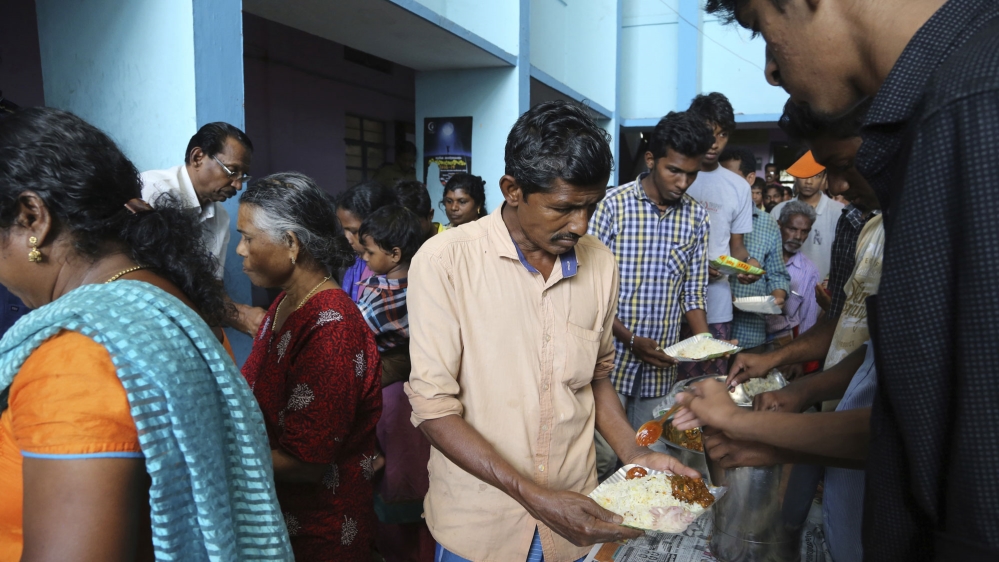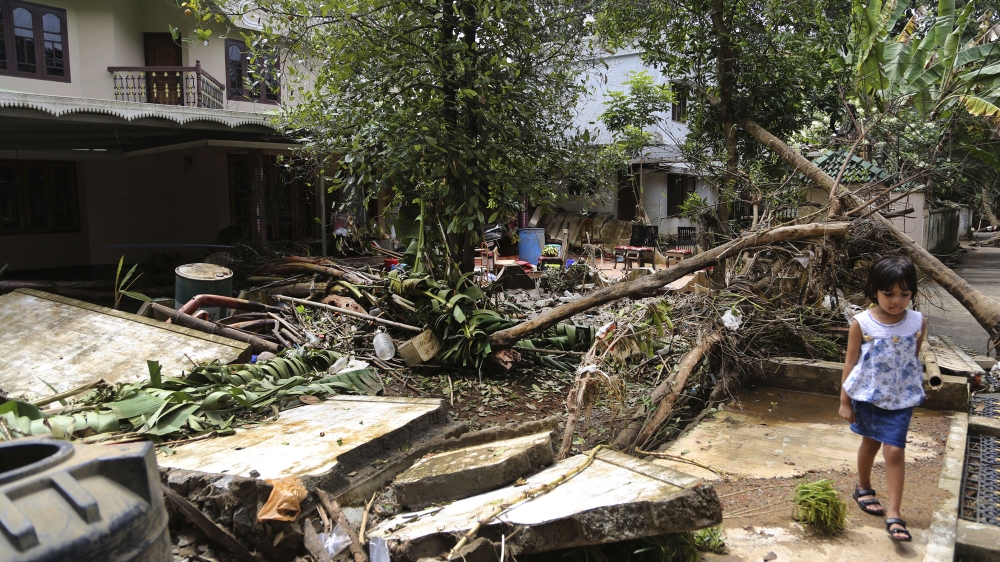Kerala flood survivors face ‘great struggle’ to rebuild lives
People in India’s flood-ravaged state of Kerala are facing a “great struggle to rebuild their lives”, local officials have warned, as high waters that have killed hundreds of people and displaced more than a million others start to recede.
Rescue teams searched throughout the southern state on Wednesday for survivors stranded during the area’s worst flooding for a century.
Torrential monsoon rains from the end of May onwards have forced an estimated 1.2 million people to shelter inside makeshift relief camps, according to government figures.
Rains subsided on Sunday after dramatically intensifying in the preceding two weeks, killing at least 238 people since August 8.
The death toll since the end of May has topped 380, while authorities say that dozens of people are still missing.
Speaking to Al Jazeera, State Relief Commissioner PH Kurian said that more than a million people remain in the camps.
“The exact number is not known, this is a dynamic figure,” he said on Wednesday.
 |
| An estimated 1.2 million people are sheltered inside makeshift relief camps [Aijaz Rahi/AP] |
As waters started receding over the past few days, authorities began taking stock of what is projected to be a months-long, if not longer, effort to rebuild the state’s devastated infrastructure and services.
Local officials estimate the floods caused $3bn of damage, with about 10,000km of Kerala’s roads and more than 100,000 houses needing to be reconstructed.
Several of Kerala’s predominant industries – including tourism as well as tea, rubber and spice plantations – have been hit particularly hard, with estimated losses totalling tens of millions of dollars.
Hotels and tour operators in several locations throughout the state have also witnessed cancellations approaching 80 percent of all bookings ahead of peak tourist season, which runs from September to March, according to Indian Association of Tour Operators figures reported by the Times of India.
On Tuesday, state Chief Minister Pinarayi Vijayan told reporters he had requested a $1.4bn loan from Prime Minister Narendra Modi’s government to finance reconstruction efforts.
“Our aim is not merely a restoration of the state to pre-flood times, but the creation of a new Kerala,” Vijayan said.
Modi has pledged $71m of assistance to date, with more funding expected to be released by the central government in coming weeks, and deployed military units to help with recovery efforts.
“This is not going to be a 100-metre sprint, it is going to be a long marathon,” Unni Krishnan, a member of Save the Children’s emergency health unit, told Al Jazeera in reference to rebuilding efforts in the state, home to more than 33 million people.
Risk of disease
Medical officials and NGOs, meanwhile, warned of a heightened risk of waterborne disease outbreaks due to the flooding.
“Water sanitation and hygiene are very crucial at this time,” Ray Kancharla, Save the Children India’s humanitarian manager, told Al Jazeera.
 |
| Save the Children has warned about an increased risk of waterborne disease outbreaks following the flooding [Aijaz Rahi/AP] |
Local health officials said earlier this week they were prepared to deal with any such emergence of disease and had distributed preventive medicines in a bid to avert an outbreak.
According to India‘s central government health index, Kerala has the best performing public health system of any state in the country.
Save the Children officials told Al Jazeera that Kerala, one of India’s wealthiest states, was well positioned to avoid any major emergence of disease because of its strong public health system and a literacy rate approaching 100 percent.
“Health and education together is the definite antidote to stop disease outbreaks,” Krishnan said.
Schools throughout Kerala remained closed on Wednesday but are set to reopen next week, Krishnan added, following the conclusion of the state’s annual Hindu harvest festival.
“There are broken houses and damaged schools but along with that some of the invisible needs such as mental health and emotional care should also be a priority … [because] children will have questions like ‘why did this happen to me?'” he said.
“There is a lot of capacity in this state but what it lacks is the contextual experience because it has never dealt with a disaster of this magnitude before.”
 |
| Schools throughout Kerala are set to reopen next week [Aijaz Rahi/AP] |




